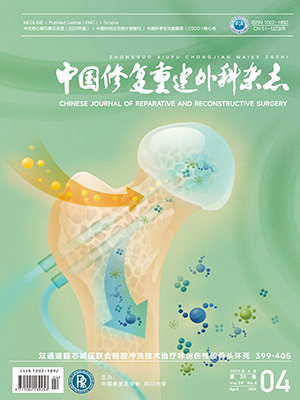Objective To investigate the effect of preoperative rehabilitation on early function of joints after total hip arthroplasty by comparing with non-preoperative rehabilitation. Methods Between March 2010 and November 2011, 98 patients with hip disease were recruited in study. Of 98 patients, 49 received preoperative rehabilitation for 2 weeks in trial group, and 49 did not receive preoperative rehabilitation in control group. There was no significant difference in gender, age, disease duration, disease cause, preoperative visual analogue scale (VAS) score, and preoperative Harris score between 2 groups (P gt; 0.05). Results There was no significant difference in VAS score at each time point after operation between 2 groups (P gt; 0.05), but significant differences were found in Harris score (P lt; 0.05). At 3 days after operation, compliance evaluation results showed that 36 cases were of full compliance, and 13 cases were of partial compliance in trial group; 27 cases were of full compliance, 14 cases were of partial compliance, and 8 cases were of non-compliance in control group; there was significant difference between 2 groups (Z=2.286, P=0.002). The ambulation time was within 7 days in trial group, and was within 7 days in 47 cases and more than 7 days in 2 cases in control group; there was significant difference between 2 groups (Z=3.840, P=0.000). Conclusion Preoperative rehabilitation plays an important role in compliance, decreased bed rest time, and hip function improvement in patients after total hip arthroplasty.
Citation: LUuml,Xiyan,WANG Yue,TAN Bo. EFFECT OF PREOPERATIVE REHABILITATION ON EARLY FUNCTION OF JOINTS AFTER TOTAL HIP ARTHROPLASTY. Chinese Journal of Reparative and Reconstructive Surgery, 2013, 27(6): 653-656. doi: 10.7507/1002-1892.20130145 Copy
Copyright © the editorial department of Chinese Journal of Reparative and Reconstructive Surgery of West China Medical Publisher. All rights reserved
-
Previous Article
EFFECTIVENESS OF Y-SHAPED OSTEOTOMY FOR DEVELOPMENTAL COXA VARA IN CHILDREN ABuLiZiTuErSong, LIGuoqing, ASiKaErMaiMaiTiMing, CAO Li. -
Next Article
EFFECT OF WEIGHT-BEARING TIME ON MICRO-FRACTURE THERAPY FOR SMALL SIZED OSTEOCHONDRAL LESION OF TALUS LIShuyuan, WANG Junliang, QU Feng, LIU Chang, LIU Yujie, WANG Zhigang, WEI Min.




